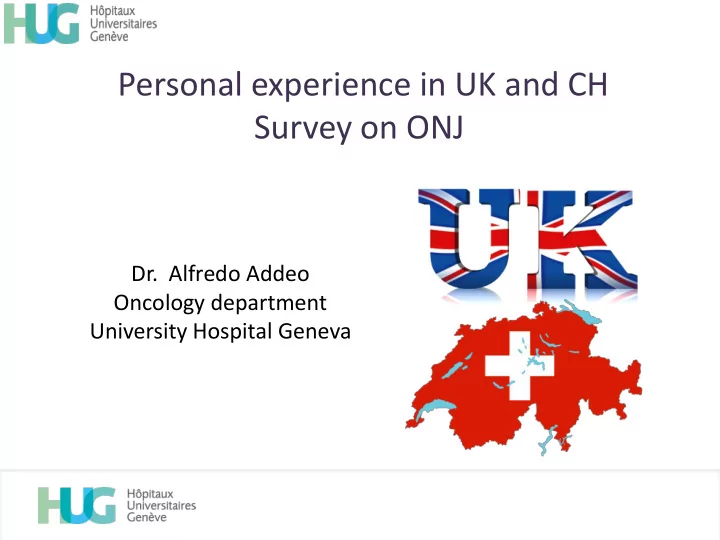

Personal experience in UK and CH Survey on ONJ Dr. Alfredo Addeo Oncology department University Hospital Geneva
Comparison or what?
DIFFERENT HEALTHCARE SYSTEMS Health care in the United Kingdom is a of publicly funded healthcare Good or bad? • 2014 Commonwealth Fund ranking developed-country healthcare systems: best healthcare system in the world overall • 2005-09 cancer survival rates lagged ten years behind the rest of Europe, survival rates continue to increase. • 2015, the UK was criticized for its poor accessibility and "an autocratic top-down management culture".
Health care in Switzerland is not tax-based or financed by employers but is paid for by the individual through contributions into Swiss health insurance schemes Good or bad? • Switzerland spends the highest percentage of GDP on healthcare (around 11.4 percent) compared to all EU countries. • Many reports suggest that Swiss healthcare is one of the best in the world. (lancet 2018, April. Global burden disease)
All patients receiving intravenous bisphosphonates should have a dental check-up. All other patients who start oral bisphosphonates should only have a dental examination before starting treatment if they have poor dental health. During all bisphosphonates treatments: 1. maintain good oral hygiene 2. receive routine dental check-ups 3. report any oral symptoms such as dental mobility, pain, or swelling https://www.gov.uk/government/publications/bisphosphonates-use-and-safety/bisphosphonates-use-and-safety
NHS dental care cover and access is the issue? Likely Patients often refuse to access private dentist and no enough capacity within public NHS dentist Link between hospital and dental Hospital but not for pre check before starting bisphosphonates Incidence is 0.7/100,000 person/years of exposure and prevalence of BRONJ 0.06% in long-term oral bisphosphonate receiver Internal Medicine News. 2008;41, article 23 .
30/07/2018
• Easy access to dental care • Routinely OPG and dental visit within 1 week max • (dentist, 50 per 100000), not more human workforce • Lack of real data on epidemiology on BRONJ and ARONJ
SURVEY Oncologists from different countries with the aim of getting a clearer picture of routine management of ONJ patients worldwide. Results: 64 responders, 37 were male (57%) and 27 female (43%); the median age (range) was.37 years. UK (20 =31%), Italy (14=21%), Switzerland (12=19%), USA (3=4,5%). Other responders from Germany, Spain, Portugal, Poland, Macedonia Rep, Romania , Georgia, Algeria, Qatar, Vietnam, Pakistan, India, Egypt.
1. Before prescription of antiresorptive drugs (zoledronic acid, denosumab, etc) in bone metastatic and myeloma patients, you require a careful dental evaluation: a) Always, sistematically 37 ( 57,81%) b) Most of cases 15 (23,44%) c) Only in case of bad oral hygiene or dental disease 8 (12,50%) d) Rarely, seldom 4 (6,25%) e) Never 0 2. The usual dental evaluation before beginning the antiresorptive treatment I a) Rx OPT and dental visit 32 (50% ) b) Rx OPT only 2 (3,13%) c) Dental visit alone 27 (42,29%) d) None 3(4,69%)
3. In case a tooth extraction is recommended by dentist before the beginning of antiresorptive treatment: a) You usually begin the treatment immediately , delaying the tooth extraction 4 (6,25%) b) You delay the antiresorptive treatment till to extraction and socket healing 44 ( 68,75%) c) You immediately begin the treatment in selected unfavorable cases (ie “aggressive” bone metastatic disease) , and delay the treatment in most of cases 15 (23,44%) d) You begin the treatment in most of cases, and delay the treatment only in favorable selected cases (ie, asymptomatic disease , good prognosis disease) 1 (1,56%)
4. After tooth\teeth extraction, you usually begin the antiresorptive treatment : a) After 2 weeks, following dental control visit (if healed socket) 14 (21.88%) b) After 4 weeks, following dental control visit (if healed socket) 37 (57,81%) c) After 4 weeks, independently by dental control visit 3 (4,69%) d) After 6-8 weeks, independently by dental control visit 8 (12,5%) e) Other 2 (3,13%)
• NO real differences in workforces between UK and CH • Easies access to dental care in CH. • Not clear epidemiology of BRONJ , ARONJ in both countries. • Social for Survey is a way to explore. • Survey results in line with international guidelines. • Data per nationality soon.
Recommend
More recommend